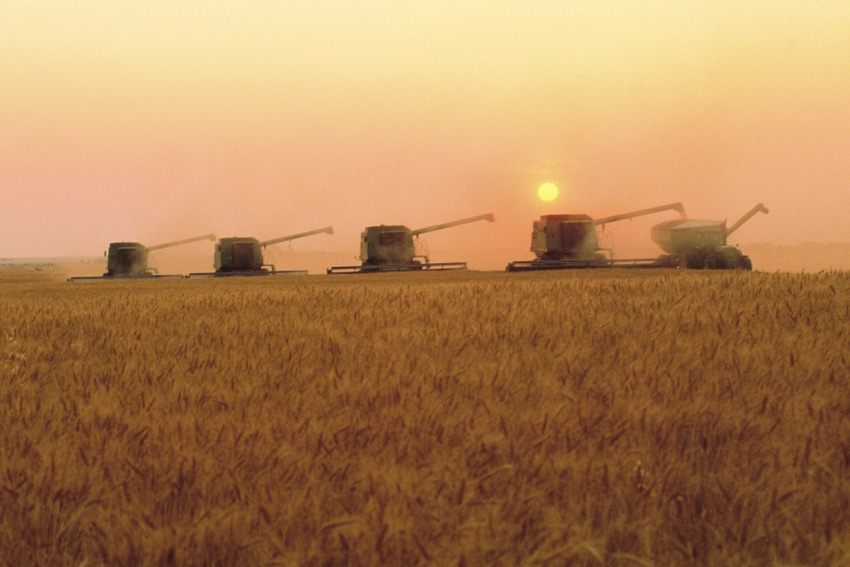U.S. has been top supplier to Chile three time in past five years.
July 7, 2017

The U.S. Wheat Associates (USW) recently welcomed a trade team of four executives from major wheat purchasing and flour producing companies in Chile to learn about U.S. wheat quality and the U.S. wheat industry as a whole.
“Good customer service is the foundation of any successful business or industry, and for the U.S. wheat industry, that means building trust, good communication and consistency in order to forge strong partnerships with overseas customers,” USW said. “That also means providing customers with timely, reliable crop information and demonstrating a commitment to improvement.”
USW marketing manager Casey Chumrau from the group's office in Santiago, Chile, explained that Chile is “a sophisticated wheat food market where bakers demand specific flour quality for a wide variety of products – led by bread consumption.”
Over the past five years, the U.S. has been the top supplier of wheat to Chile three times, with an average of 383,000 metric tons, Chumrau said.
Chumrau, who led the trade team, said when the buyers learned that the 2017 hard red winter wheat crop would be low in protein, they were open to discuss potential adjustments to their purchases to help meet their functional needs.
The team began its trip in Oklahoma, where it took a broad look at the complete supply chain with visits to grain and seed companies, a train loading facility and marketers. The team also visited the Oklahoma Wheat Commission Baking Laboratory, which provided an opportunity to discuss the characteristics Chile's millers and bakers need for their competitive market.
From there, the team traveled to California, where they had the unique opportunity to meet with Nicolas Cobo Lewin, a Chilean Ph.D. candidate at the University of California-Davis who specializes in wheat breeding.
“Breeding was one of the main topics of interest for this team, and Mr. Cobo was able to explain the process and importance of breeding in a very understandable manner,” Chumrau said.
While in California, the team also visited the Port of Stockton, a Federal Grain Inspection Service grading facility and the California Wheat Commission Lab.
“California wheat farmers value building strong relationships with our customers, and this was a crucial and very important opportunity for us to build those relationships with millers and wheat buyers from Chile,” California Wheat Commission executive director Claudia Carter said.
The team also traveled to Washington and Idaho, where the two state wheat commissions worked together to focus on the team’s interests. Chile is the largest buyer of soft white wheat in South America, and earlier this year, the Washington Grain Commission organized a team of wheat farmers to travel to Chile to meet with buyers.
“Having this Chilean team come to the Pacific Northwest strengthens our relationship with an important customer and allows those millers who do not yet purchase soft white wheat to gain a better understanding of what it has to offer their operations,” Washington Grain Commission chief executive officer Glen Squires said.
Additional visits in Washington and Idaho included HighLine Grain LLC, a 110-car rail facility; the Lewis-Clark Terminal barge loading facility, and a farm visit. During their visit to the U.S. Department of Agriculture's Agricultural Research Service Wheat Quality Lab, the team met with Dr. Kim Campbell to learn more about club wheat and its potential end product applications.
One participant said he thought it was important to see and experience the link between wheat breeding, farm production and grain handling that results in the wheat used in the organization’s mills.
“This trip featured almost every point of the supply chain,” Chumrau said. “The team repeatedly emphasized the importance of quality and was impressed with the extensive work being done in Oklahoma, California and the Pacific Northwest to produce new varieties with the buyer in mind.”
USW activities in more than 100 countries are made possible through producer checkoff dollars managed by 18 state wheat commissions and cost-share funding provided by USDA’s Foreign Agricultural Service (FAS). USW collaborated with the wheat commissions in Oklahoma, California, Washington and Idaho to organize and host this trade team. Funding also came from FAS.
You May Also Like



